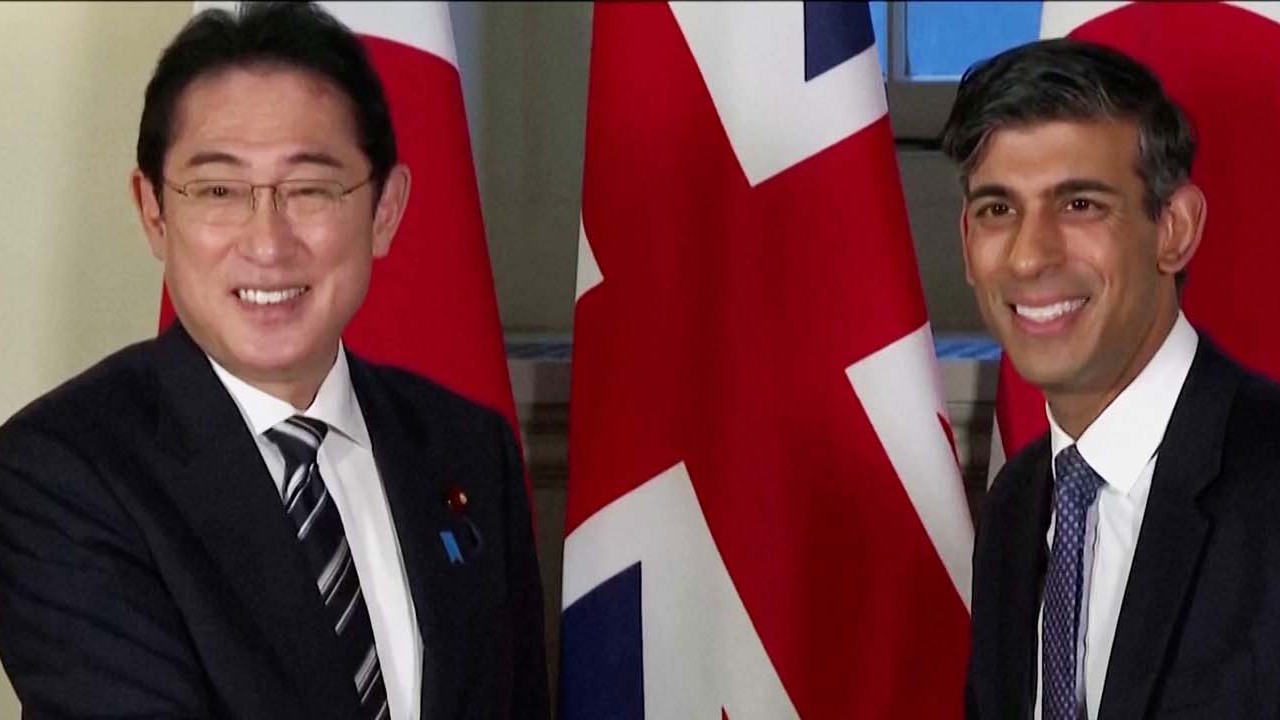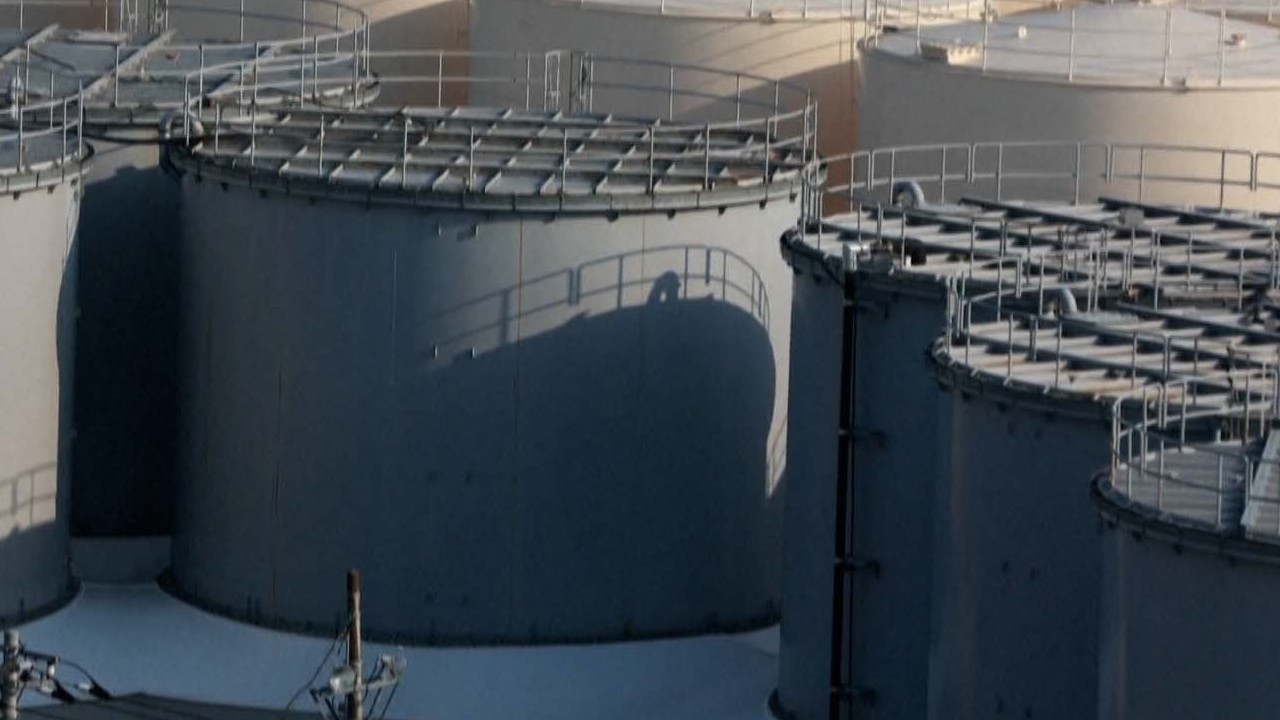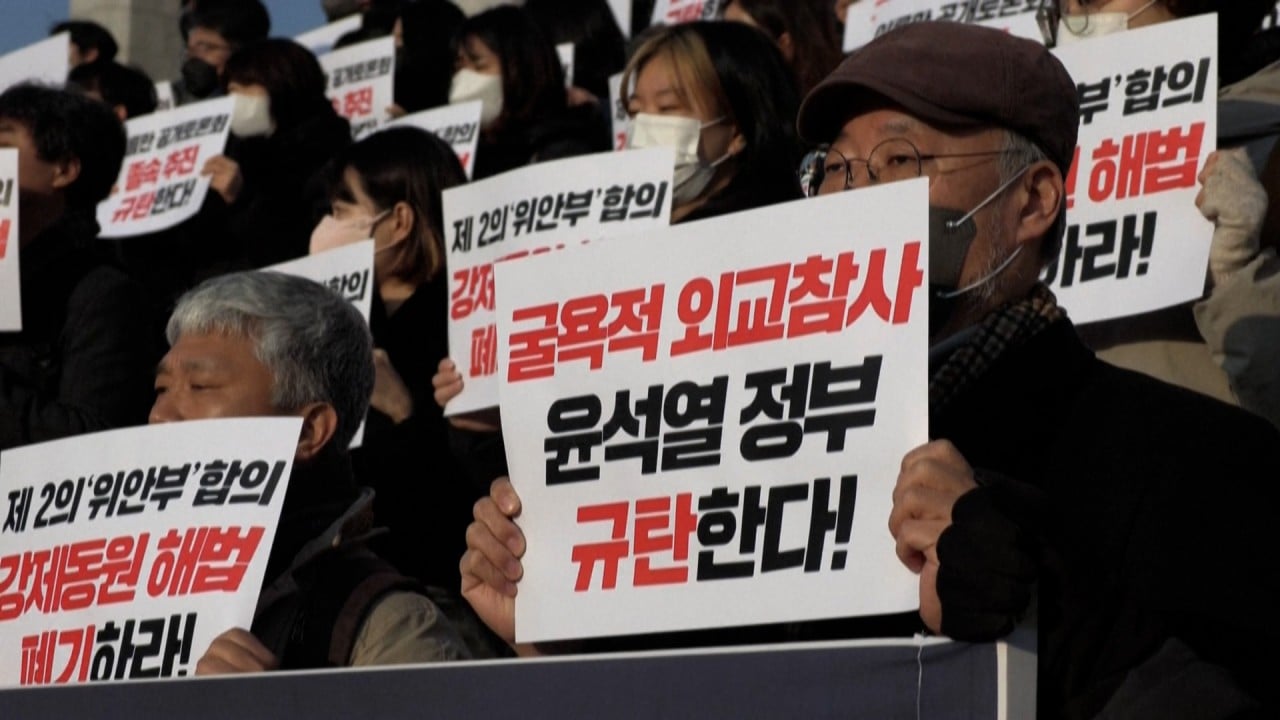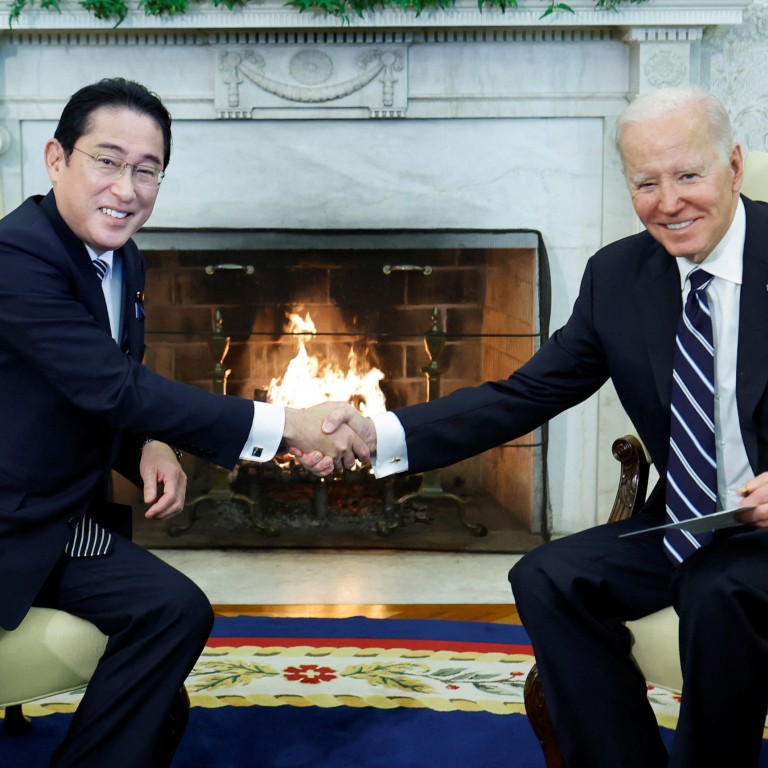
Biden and Kishida pledge to strengthen US-Japan ties as a counter to China
- The statement by the US president and Japanese prime minister cited challenges posed by ‘actions inconsistent with the rules-based international order by China’
- The meeting followed agreements earlier in the week by top military and diplomatic officials from both sides to harden Tokyo’s air, sea, land, cyber and space defences
US President Joe Biden and Japanese Prime Minister Fumio Kishida, meeting in Washington on Friday, pledged to strengthen their nations’ ties, coordinate their global leadership agendas and bolster alliances in the Indo-Pacific region to counter an increasingly powerful China.
“Our security alliance has never been stronger,” the leaders said in a joint statement that included an exhaustive rundown of areas of agreement – from defence and economics to critical technologies and gender equality – but ploughed little new ground.
“At the same time, the Indo-Pacific faces growing challenges, from actions inconsistent with the rules-based international order by China to provocations by North Korea.”
Biden and Kishida opted not to hold a press conference after their meeting – often customary after summits – relying instead on a photo opportunity and the statement.
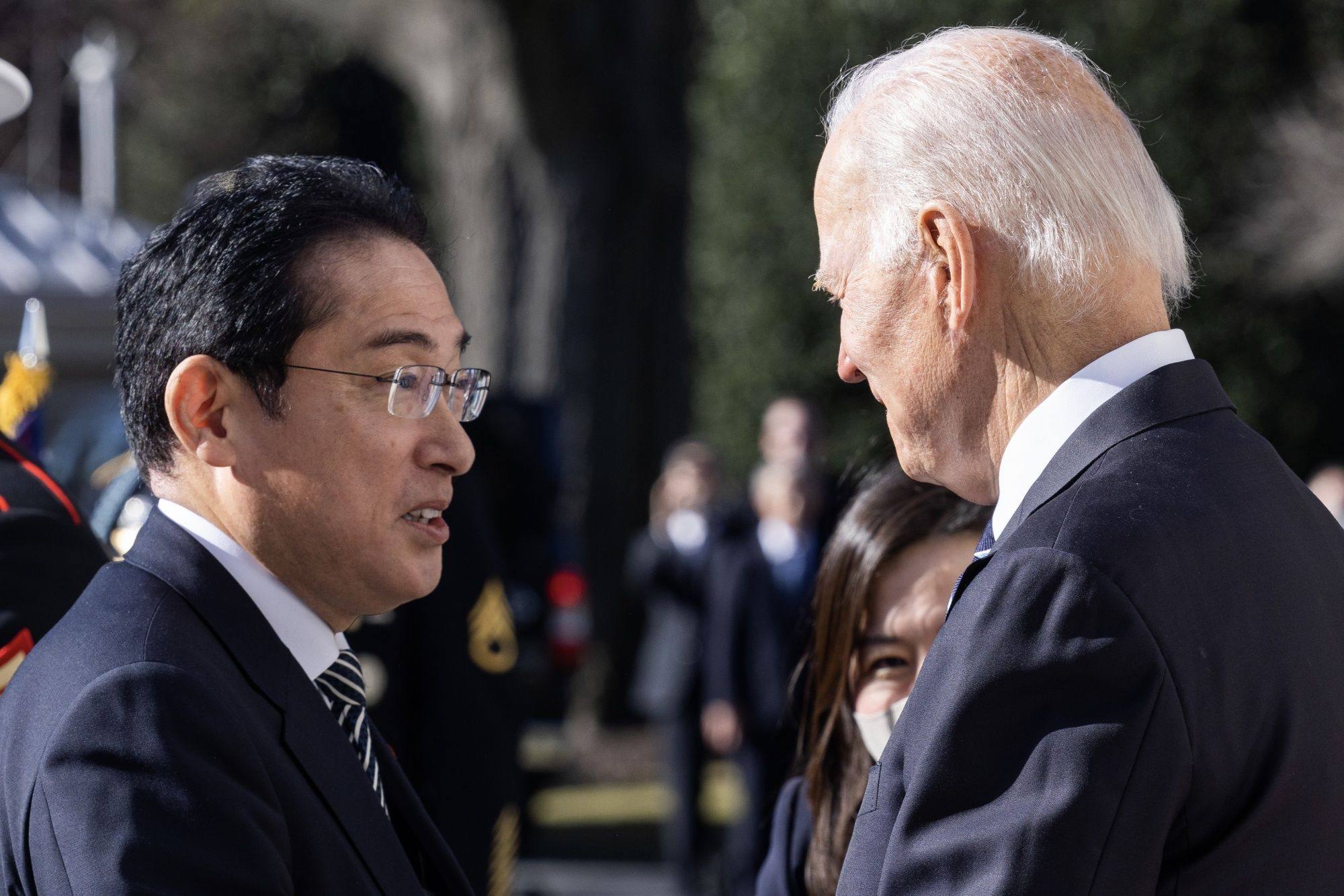
A key development on Wednesday was an agreement to extend Article V of their mutual security treaty, which calls on each side to come to the other’s defence, into space. China has accelerated the development of laser-based weapons, according to a Pentagon report, and Japan’s communication satellites are unprotected.
In a bid to project a more positive agenda as space becomes increasingly militarised, the two nations signed a US-Japan Space Cooperation Framework Agreement on Friday to jointly explore “the moon and other celestial bodies, for peaceful purposes”.
Japan calls on UN to ‘unite’ around rule of law in veiled dig at China
“This framework agreement will intensify and strengthen our bilateral cooperation,” said Secretary of State Antony Blinken as Kishida looked on against an artificial backdrop of stars and galaxies. “Through this agreement, we will go farther and learn even more together.”
Friday’s pageantry and symbolism is likely to benefit Kishida politically more than Biden. Kishida’s polling results dipped to the low 30s by the end of 2022 in part due to inflation, a controversial decision to give former prime minister Shinzo Abe a state funeral and political funding scandals that saw four of his cabinet members resign within two months.
Washington’s full-throated support for Kishida’s defence policies this week – and US moves to decentralise its forces in Okinawa in the face of local community anger over the large US presence – could blunt tough headwinds facing the seasoned Japanese politician.
“He faces an uphill climb at home,” said Yuko Nakano, Japan fellow with the Centre for Strategic and International Studies. “Chatter about a possible snap election has increased suddenly in the past few weeks.”
This summit also aimed to remind the Japanese public of Kishida’s diplomatic chops as Japan’s longest-serving foreign minister in post-war history and to shore up his political stature with Japan’s parliament, which reconvenes later this month.
“I think there is a photo-op purpose to it, especially for Kishida, given his poll numbers,” said Jeffrey Hornung, a political scientist with the Rand Corporation.
“But it’s also about being able to project the message to China: ‘We are close. Yes, we might not have a deep, substantive agenda, but we’re still meeting each other, because that’s what allies do.’”
Biden, whose approval numbers are not much better than Kishida’s, also benefits from closer bilateral relations and Japan’s growing willingness to stand up to China in his dealings with Southeast Asian and Pacific Island nations, which are also being courted by both Beijing, analysts said.
US-Japan alliance against China could spell trouble for region: analysts
“Having the White House as the backdrop will be a nice political win for Kishida, who has not had many lately,” David Boling, a Eurasia Group analyst, said.
“And Japan has become for the US the indispensable partner in dealing with China. More cooperation, more coordination or deepness in the relationship is a win for Biden,” Boling, a former Japan negotiator with the US Trade Representative office, added.
While the week’s headlines focused largely on US-Japan military coordination, the two leaders also spent time mapping out economic and trade strategies.
Japan just started a two-year term on the UN Security Council as a non-permanent member and hosts the Group of 7 in Hiroshima in May, while the US will host the Asia-Pacific Economic Cooperation summit in November in San Francisco.
Issues high on the leaders’ agenda were slowing global growth; rising interest rates; continuing pandemic concerns; and higher food and energy prices.
Washington also seeks Tokyo’s aid in blunting economic coercion and limiting sales of advanced semiconductors to China, which are significantly more effective if allies cooperate.
“Trade not purely for trade’s sake but also for its impact on national security,” Boling said.
A point of frustration for Japan and other Asian nations has been the US withdrawal from the Trans-Pacific Partnership – one of former president Donald Trump’s first official moves in early 2017 – and its refusal to join the successor pact, the Comprehensive and Progressive Agreement for Trans-Pacific Partnership (CPTPP).
With US nativists and labour interests on the ascent, multilateral trade deals have become politically toxic. Japan has pushed ahead, but momentum has lagged without the US, the world’s largest economy.
US talks with allies will yield no immediate chip-tool curb on China
This week, Kiyotaka Morita, international affairs deputy director with Keidanren, Japan’s powerful business association, said that another way to bring Washington back to multilateral trade negotiations might be a new “free trade and investment club” based on G7 principles. Japan has vowed to put this high on this year’s G7 agenda.
While the proposed framework would be open to “all countries and regions”, its core principles would rest on existing trade agreements of G7 members, Morita said at the CSIS, even as he played down any immediate Chinese participation.
“We want the US back in the CPTPP before we start any sort of talks with China,” Morita said. “We do welcome China to join if China is ready to comply with the high standards of the CPTPP.”

Japan walks a fine line, however. China is among its biggest security threats, but also its largest trading partner.
Tokyo has sought to maintain what it calls a “constructive and stable” relationship with Beijing, in keeping with Kishida and Chinese President Xi Jinping’s November meeting in Bangkok at which they agreed in principle to resume high-level economic talks.
Analysts said Kishida and Biden likely discussed US industrial policies that some allies see as unduly favouring US products over imports, an implicit criticism of the protectionist elements of the Inflation Reduction Act that Biden signed into law last summer.
An important subtext of the defence-focused summit was Japan’s historically fraught relations with South Korea. “We commit to strengthening vital trilateral cooperation among Japan, the Republic of Korea, and the United States, in security and other domains,” Friday’s joint statement said.
New administrations in Tokyo and Seoul – both Kishida and South Korean President Yoon Suk-yeol were elected recently – offer some hope of lessening tensions, especially if some settlement can be reached over the thorny issue of forced Korean labour by Japan during World War II, but passions run deep.
The military logic of closer ties is clear, said Itsunori Onodera, a former Japanese defence minister involved in revising the national defence and security blueprints.
“If there were a conflict in East Asia, both countries are highly dependent on maritime transport,” he said.
“So it’s important not to have a conflict, not to have the military power balance get out of kilter. I think we have this in common.”
Additional reporting by Robert Delaney


